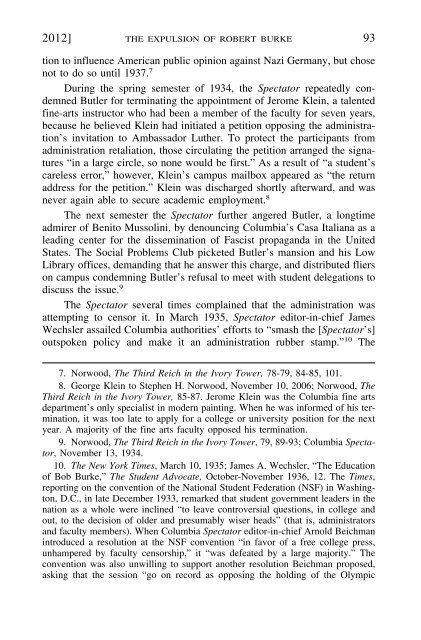Volume 4 No 1 - Journal for the Study of Antisemitism
Volume 4 No 1 - Journal for the Study of Antisemitism
Volume 4 No 1 - Journal for the Study of Antisemitism
Create successful ePaper yourself
Turn your PDF publications into a flip-book with our unique Google optimized e-Paper software.
2012] THE EXPULSION OF ROBERT BURKE 93<br />
tion to influence American public opinion against Nazi Germany, but chose<br />
not to do so until 1937. 7<br />
During <strong>the</strong> spring semester <strong>of</strong> 1934, <strong>the</strong> Spectator repeatedly condemned<br />
Butler <strong>for</strong> terminating <strong>the</strong> appointment <strong>of</strong> Jerome Klein, a talented<br />
fine-arts instructor who had been a member <strong>of</strong> <strong>the</strong> faculty <strong>for</strong> seven years,<br />
because he believed Klein had initiated a petition opposing <strong>the</strong> administration’s<br />
invitation to Ambassador Lu<strong>the</strong>r. To protect <strong>the</strong> participants from<br />
administration retaliation, those circulating <strong>the</strong> petition arranged <strong>the</strong> signatures<br />
“in a large circle, so none would be first.” As a result <strong>of</strong> “a student’s<br />
careless error,” however, Klein’s campus mailbox appeared as “<strong>the</strong> return<br />
address <strong>for</strong> <strong>the</strong> petition.” Klein was discharged shortly afterward, and was<br />
never again able to secure academic employment. 8<br />
The next semester <strong>the</strong> Spectator fur<strong>the</strong>r angered Butler, a longtime<br />
admirer <strong>of</strong> Benito Mussolini, by denouncing Columbia’s Casa Italiana as a<br />
leading center <strong>for</strong> <strong>the</strong> dissemination <strong>of</strong> Fascist propaganda in <strong>the</strong> United<br />
States. The Social Problems Club picketed Butler’s mansion and his Low<br />
Library <strong>of</strong>fices, demanding that he answer this charge, and distributed fliers<br />
on campus condemning Butler’s refusal to meet with student delegations to<br />
discuss <strong>the</strong> issue. 9<br />
The Spectator several times complained that <strong>the</strong> administration was<br />
attempting to censor it. In March 1935, Spectator editor-in-chief James<br />
Wechsler assailed Columbia authorities’ ef<strong>for</strong>ts to “smash <strong>the</strong> [Spectator’s]<br />
outspoken policy and make it an administration rubber stamp.” 10 The<br />
7. <strong>No</strong>rwood, The Third Reich in <strong>the</strong> Ivory Tower, 78-79, 84-85, 101.<br />
8. George Klein to Stephen H. <strong>No</strong>rwood, <strong>No</strong>vember 10, 2006; <strong>No</strong>rwood, The<br />
Third Reich in <strong>the</strong> Ivory Tower, 85-87. Jerome Klein was <strong>the</strong> Columbia fine arts<br />
department’s only specialist in modern painting. When he was in<strong>for</strong>med <strong>of</strong> his termination,<br />
it was too late to apply <strong>for</strong> a college or university position <strong>for</strong> <strong>the</strong> next<br />
year. A majority <strong>of</strong> <strong>the</strong> fine arts faculty opposed his termination.<br />
9. <strong>No</strong>rwood, The Third Reich in <strong>the</strong> Ivory Tower, 79, 89-93; Columbia Spectator,<br />
<strong>No</strong>vember 13, 1934.<br />
10. The New York Times, March 10, 1935; James A. Wechsler, “The Education<br />
<strong>of</strong> Bob Burke,” The Student Advocate, October-<strong>No</strong>vember 1936, 12. The Times,<br />
reporting on <strong>the</strong> convention <strong>of</strong> <strong>the</strong> National Student Federation (NSF) in Washington,<br />
D.C., in late December 1933, remarked that student government leaders in <strong>the</strong><br />
nation as a whole were inclined “to leave controversial questions, in college and<br />
out, to <strong>the</strong> decision <strong>of</strong> older and presumably wiser heads” (that is, administrators<br />
and faculty members). When Columbia Spectator editor-in-chief Arnold Beichman<br />
introduced a resolution at <strong>the</strong> NSF convention “in favor <strong>of</strong> a free college press,<br />
unhampered by faculty censorship,” it “was defeated by a large majority.” The<br />
convention was also unwilling to support ano<strong>the</strong>r resolution Beichman proposed,<br />
asking that <strong>the</strong> session “go on record as opposing <strong>the</strong> holding <strong>of</strong> <strong>the</strong> Olympic














